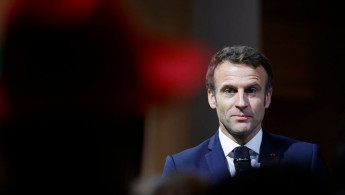Macron admits crisis with Rabat, promises overcoming 'the controversy'
French President Emmanuel Macron admitted for the first time publicly shaky relations with Rabat over the "wiretapping" scandal after a year of the Elysée denying any "crisis" with the North African kingdom.
"We will move forward. The stage is not the best, but this matter will not stop me," Macron said during a press conference in which he discussed France's new strategy in the African continent.
Macron, who promised a policy of "profound humility" in Africa, vowed Monday to overcome "the controversy" with Morocco, France's key trade partner in the African continent.
"There are always people trying to take advantage of circumstances, like the wiretapping scandals in the European Parliament that were exposed by the press," he added.
In a recommendation approved by a large majority at the end of January, the European Parliament urged the Moroccan authorities to "respect freedom of expression and freedom of the media" and to put an end to "the harassment of journalists."
The EU parliament also expressed "deep concern" about "allegations that the Moroccan authorities have corrupted members of the European Parliament."
Some voices in Morocco believed that France stands behind the "anti-Morocco" recommendation of the European Parliament, while relations were already rigid between Paris and Rabat for months.
On the resolution day, Morocco officially ended the duties of its ambassador to France Mohamed Benchaâboun.
"Was that the French government's handiwork? No! Did France add fuel to the fire? No! We must move forward despite these differences," the French president said as he assured that his personal relationship with the Moroccan King is always "friendly."
Although speculative, the first signs of coldness between Paris and Rabat started showing right after the Pegasus scandal in 2021 when the daily Le Monde revealed that the cell phones of Macron and fifteen members of the French government were likely among the targets of an unidentified Moroccan security service.
Since then, communication between Macron and Mohammed VI has reportedly stopped.
Paris' 'ambiguous' position on Western Sahara, a key diplomatic file for the Moroccan state, has fueled further Rabat anger.
Western Sahara is a disputed territory over which Rabat and Algeria-backed separatist Polisario Front claim sovereignty. The UN recognises neither.
Grappling with an energy crisis at home and losing ground on the African continent, Macron is trying to build bridges with Algeria, Rabat's arch enemy, without burning those established with Morocco.
So far, the French president's tightrope policy in the Maghreb has not worked.
On 8 February, Algeria summoned its ambassador to France for "consultations" to protest the "Paris intervention" in easing Franco-Algerian activist Amira Bouraoui's departure from Tunisia to France.
"I know I can count on the friendship and commitment of (Algerian) President Tebboune. We will make progress with him as well," Macron added Monday.





 Follow the Middle East's top stories in English at The New Arab on Google News
Follow the Middle East's top stories in English at The New Arab on Google News


